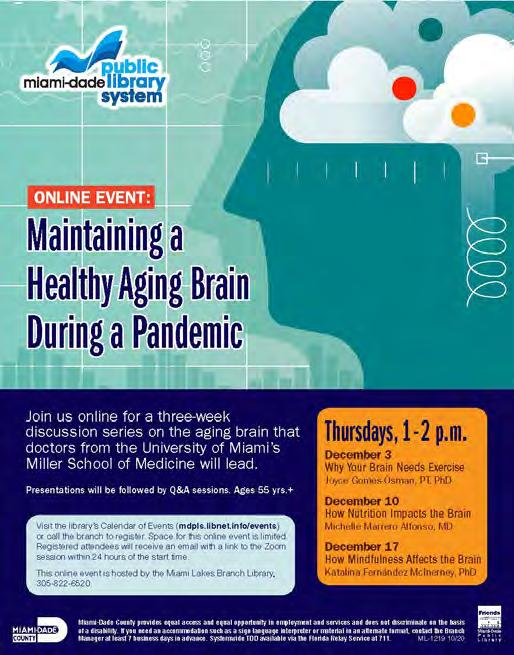
3 minute read
Most Important Scientific Achievement This Year
3. Clinical-Translational Activities and Scientific Achievements
Dr. Bonnie Levin with her team had two major clinical achievements: • Dr. Levin and team developed a comprehensive neuropsychological battery for virtual-online administration to neurology patients. This virtual cognitive battery utilizes state of the art materials to evaluate cognitive and emotional well-being among those who are unable to engage in face-to-face cognitive testing. With the sudden onset of the COVID-19 Pandemic, it was an imperative measure to institute. Dr. Levin’s cognitive clinic is one of the few centers in the country that has managed to rapidly build entirely fully functional online patient cognitive assessments that are feasible, reliable and valid, and adapted to English and Spanish language. This virtual cognitive program is now used in our clinics and research programs.
• Dr. Levin expanded the Schoninger Neuropsychology Program to include another arm dedicated to neurocognitive rehabilitation and cognitive interventions. The outline of this new program is included in Appendix II.
Dr. Tatjana Rundek’s two grants were awarded this year. • “Carotid Ultrasound Imaging Markers of AGINg and Endothelial function in Risk of Alzheimer’s
Disease: The Florida IMAGINE Study of AD Risk” was awarded by the Ed and Ethel Moore
Alzheimer Disease Research Program of FL DOH in December 2020. The proposed project
will examine the atherosclerotic markers of carotid artery disease as important contributors to cognitive aging, vascular brain pathology and development of a mixed vascular cognitive impairment and Alzheimer’s Disease phenotype.
• As a part of the One Florida ADRC awarded in June of 2020 to UF, UM and Mt. Sinai, Research
Educational Core (REC) was awarded to Dr. Rundek and Dr. Glenn Smith from UF to co-lead clinical and research education in aging and neurodegenerative disorders for junior faculty across 1FL ADRC. They have selected 3 junior faculty who already started the program.
Dr. Bonnie Levin’s grant “Detection and reduction of scam susceptibility among Hispanic/Latinx and non-Hispanic/Latinx individuals with mild cognitive impairment and Alzheimer's disease” was awarded by the Ed and Ethel Moore Alzheimer Disease Research Program of FL DOH in December 2020. The proposed grant plans to develop an educational intervention for Hispanic and nonHispanic elderly individuals and their caregivers/partners who are residing independently in the community but susceptible to being scammed.
Dr. Alberto Ramos’s NIH R01 grant application “Sleep in Neurocognitive Aging and Alzheimer’s Disease” received an excellent score by the NIA and will be funded in 2021.
This year, Dr. James Galvin joined our Department of Neurology and MBI with his clinical and research team. This was a major recruitment to our Department in 2020. Dr. Galvin brings a large NIH grant portfolio, research programs and awards to our Department (listed in the Awards section of this report). Dr. Galvin is the newest member of our MBI Scientific Advisory Board (see Appendix V for UM-MBI organizational chart). He is Director of the Comprehensive Center for Brain Health (CCBH), a recently established Center in the Department of Neurology and approved by the UM Senate. The core mission of CCBH is brain health and prevention of cognitive disorders. Dr. Galvin’s multi-disciplinary approach aims to better understand dysfunctions of the aging brain and to design treatments to prevent neurological disorders with particular focus on Lewy Body Disease and other types of dementia. Both MBI and CCBH have a different scientific focus but complementary missions to improve brain health. Therefore, the collaboration of both centers will strengthen our research, clinical and educational programs that are unified around the understanding of brain function in aging and interventions to prevent age-related memory loss and other cognitive dysfunctions, and increase quality of life through the aging process.
4. Basic Science Achievements by the Early-Stage Investigators
Dr. Regina Vontell, assistant research professor in the Department of Neurology Brain Bank (NIH NueroBioBank contract) conducted novel research that could lead to earlier intervention to improve cognition and delay later cognitive decline. She has found deviations in brain development that occur in cases of Trisomy 21 by closely investigating the complex interplay between radial glia and neuronal development. Her proposed therapies target only childhood







